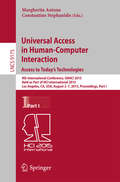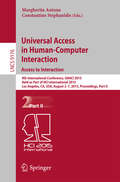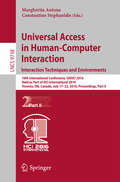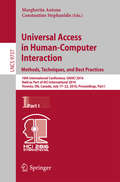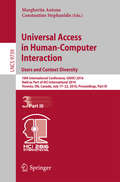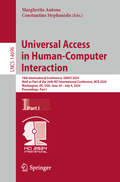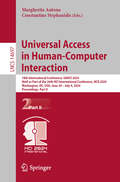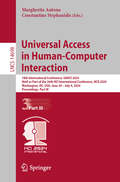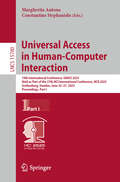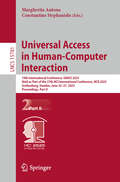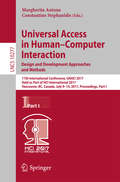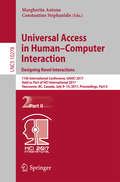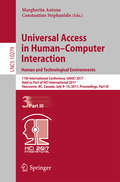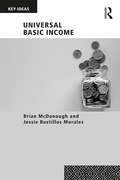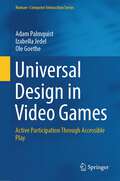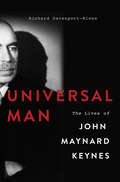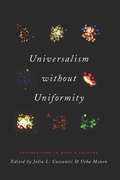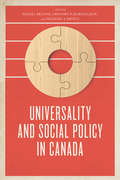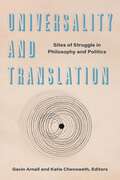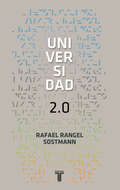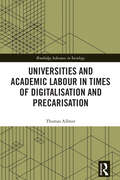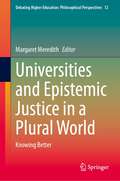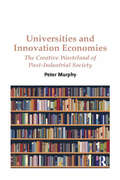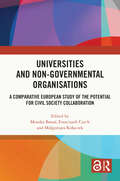- Table View
- List View
Universal Access in Human-Computer Interaction. Access to Today's Technologies
by Margherita Antona Constantine StephanidisThe four LNCS volume set 9175-9178 constitutes the refereed proceedings of the 9th International Conference on Learning and Collaboration Technologies, UAHCI 2015, held as part of the 17th International Conference on Human-Computer Interaction, HCII 2015, in Los Angeles, CA, USA in August 2015, jointly with 15 other thematically similar conferences. The total of 1462 papers and 246 posters presented at the HCII 2015 conferences were carefully reviewed and selected from 4843 submissions. These papers of the four volume set address the following major topics: LNCS 9175, Universal Access in Human-Computer Interaction: Access to today's technologies (Part I), addressing the following major topics: LNCS 9175: Design and evaluation methods and tools for universal access, universal access to the web, universal access to mobile interaction, universal access to information, communication and media. LNCS 9176: Gesture-based interaction, touch-based and haptic Interaction, visual and multisensory experience, sign language technologies, and smart and assistive environments LNCS 9177: Universal Access to Education, universal access to health applications and services, games for learning and therapy and cognitive disabilities and cognitive support and LNCS 9178: Universal access to culture, orientation, navigation and driving, accessible security and voting, universal access to the built environment and ergonomics and universal access.
Universal Access in Human-Computer Interaction. Access to Interaction
by Margherita Antona Constantine StephanidisThe four LNCS volume set 9175-9178 constitutes the refereed proceedings of the 9th International Conference on Learning and Collaboration Technologies, UAHCI 2015, held as part of the 17th International Conference on Human-Computer Interaction, HCII 2015, in Los Angeles, CA, USA in August 2015, jointly with 15 other thematically similar conferences. The total of 1462 papers and 246 posters presented at the HCII 2015 conferences were carefully reviewed and selected from 4843 submissions. These papers of the four volume set address the following major topics: LNCS 9175, Universal Access in Human-Computer Interaction: Access to today's technologies (Part I), addressing the following major topics: LNCS 9175: Design and evaluation methods and tools for universal access, universal access to the web, universal access to mobile interaction, universal access to information, communication and media. LNCS 9176: Gesture-based interaction, touch-based and haptic Interaction, visual and multisensory experience, sign language technologies and smart and assistive environments LNCS 9177: Universal Access to Education, universal access to health applications and services, games for learning and therapy, and cognitive disabilities and cognitive support and LNCS 9178: Universal access to culture, orientation, navigation and driving, accessible security and voting, universal access to the built environment and ergonomics and universal access.
Universal Access in Human-Computer Interaction. Interaction Techniques and Environments
by Margherita Antona Constantine StephanidisThe three-volume set LNCS 9737-9739 constitutes the refereed proceedings of the 10th International Conference on Universal Access in Human-Computer Interaction, UAHCI 2016, held as part of the 10th International Conference on Human-Computer Interaction, HCII 2016, in Toronto, ON, Canada in July 2016, jointly with 15 other thematically similar conferences. The total of 1287 papers presented at the HCII 2016 conferences were carefully reviewed and selected from 4354 submissions. The papers included in the three UAHCI 2016 volumes address the following major topics: novel approaches to accessibility; design for all and eInclusion best practices; universal access in architecture and product design; personal and collective informatics in universal access; eye-tracking in universal access; multimodal and natural interaction for universal access; universal access to mobile interaction; virtual reality, 3D and universal access; intelligent and assistive environments; universal access to education and learning; technologies for ASD and cognitive disabilities; design for healthy aging and rehabilitation; universal access to media and games; and universal access to mobility and automotive.
Universal Access in Human-Computer Interaction. Methods, Techniques, and Best Practices
by Margherita Antona Constantine StephanidisThe three-volume set LNCS 9737-9739 constitutes the refereed proceedings of the 10th International Conference on Universal Access in Human-Computer Interaction, UAHCI 2016, held as part of the 10th International Conference on Human-Computer Interaction, HCII 2016, in Toronto, ON, Canada in July 2016, jointly with 15 other thematically similar conferences. The total of 1287 papers presented at the HCII 2016 conferences were carefully reviewed and selected from 4354 submissions. The papers included in the three UAHCI 2016 volumes address the following major topics: novel approaches to accessibility; design for all and eInclusion best practices; universal access in architecture and product design; personal and collective informatics in universal access; eye-tracking in universal access; multimodal and natural interaction for universal access; universal access to mobile interaction; virtual reality, 3D and universal access; intelligent and assistive environments; universal access to education and learning; technologies for ASD and cognitive disabilities; design for healthy aging and rehabilitation; universal access to media and games; and universal access to mobility and automotive.
Universal Access in Human-Computer Interaction. Users and Context Diversity
by Margherita Antona Constantine StephanidisThe three-volume set LNCS 8009-8011 constitutes the refereed proceedings of the 7th International Conference on Universal Access in Human-Computer Interaction, UAHCI 2013, held as part of the 15th International Conference on Human-Computer Interaction, HCII 2013, held in Las Vegas, USA in July 2013, jointly with 12 other thematically similar conferences. The total of 1666 papers and 303 posters presented at the HCII 2013 conferences was carefully reviewed and selected from 5210 submissions. These papers address the latest research and development efforts and highlight the human aspects of design and use of computing systems. The papers accepted for presentation thoroughly cover the entire field of human-computer interaction, addressing major advances in knowledge and effective use of computers in a variety of application areas. The total of 230 contributions included in the UAHCI proceedings were carefully reviewed and selected for inclusion in this three-volume set. The 78 papers included in this volume are organized in the following topical sections: age-related issues, human vision in universal access, emotions and persuasion in universal access, design for autistic spectrum disorders, cognitive issues for universal access, universal access to the Web and social communities.
Universal Access in Human-Computer Interaction: 18th International Conference, UAHCI 2024, Held as Part of the 26th HCI International Conference, HCII 2024, Washington, DC, USA, June 29 – July 4, 2024, Proceedings, Part I (Lecture Notes in Computer Science #14696)
by Margherita Antona Constantine StephanidisThis three-volume set LNCS 14696-14698 constitutes the refereed proceedings of the 18th International Conference on Universal Access in Human-Computer Interaction, UAHCI 2024, held as part of the 26th International Conference, HCI International 2024, in Washington, DC, USA, during June 29 – July 4, 2024. The total of 1271 papers and 309 posters included in the HCII 2024 proceedings was carefully reviewed and selected from 5108 submissions. The UAHCI 2024 proceedings were organized in the following topical sections: Part I: User Experience Design and Evaluation for Universal Access; AI for Universal Access. Part II: Universal Access to Digital Services; Design for Cognitive Disabilities; Universal Access to Virtual and Augmented Reality. Part III: Universal Access to Learning and Education; Universal Access to Health and Wellbeing; Universal Access to Information and Media.
Universal Access in Human-Computer Interaction: 18th International Conference, UAHCI 2024, Held as Part of the 26th HCI International Conference, HCII 2024, Washington, DC, USA, June 29 – July 4, 2024, Proceedings, Part II (Lecture Notes in Computer Science #14697)
by Margherita Antona Constantine StephanidisThis three-volume set LNCS 14696-14698 constitutes the refereed proceedings of the 18th International Conference on Universal Access in Human-Computer Interaction, UAHCI 2024, held as part of the 26th International Conference, HCI International 2024, in Washington, DC, USA, during June 29 – July 4, 2024. The total of 1271 papers and 309 posters included in the HCII 2024 proceedings was carefully reviewed and selected from 5108 submissions. The UAHCI 2024 proceedings were organized in the following topical sections: Part I: User Experience Design and Evaluation for Universal Access; AI for Universal Access. Part II: Universal Access to Digital Services; Design for Cognitive Disabilities; Universal Access to Virtual and Augmented Reality. Part III: Universal Access to Learning and Education; Universal Access to Health and Wellbeing; Universal Access to Information and Media.
Universal Access in Human-Computer Interaction: 18th International Conference, UAHCI 2024, Held as Part of the 26th HCI International Conference, HCII 2024, Washington, DC, USA, June 29 – July 4, 2024, Proceedings, Part III (Lecture Notes in Computer Science #14698)
by Margherita Antona Constantine StephanidisThis three-volume set LNCS 14696-14698 constitutes the refereed proceedings of the 18th International Conference on Universal Access in Human-Computer Interaction, UAHCI 2024, held as part of the 26th International Conference, HCI International 2024, in Washington, DC, USA, during June 29 – July 4, 2024. The total of 1271 papers and 309 posters included in the HCII 2024 proceedings was carefully reviewed and selected from 5108 submissions. The UAHCI 2024 proceedings were organized in the following topical sections: Part I: User Experience Design and Evaluation for Universal Access; AI for Universal Access. Part II: Universal Access to Digital Services; Design for Cognitive Disabilities; Universal Access to Virtual and Augmented Reality. Part III: Universal Access to Learning and Education; Universal Access to Health and Wellbeing; Universal Access to Information and Media.
Universal Access in Human-Computer Interaction: 19th International Conference, UAHCI 2025, Held as Part of the 27th HCI International Conference, HCII 2025, Gothenburg, Sweden, June 22–27, 2025, Proceedings, Part I (Lecture Notes in Computer Science #15780)
by Margherita Antona Constantine StephanidisThis 2-volume set LNCS 15780-15781 constitutes the refereed proceedings of the 19th International Conference on Universal Access in Human-Computer Interaction, UAHCI 2025, held as part of the 27th International Conference, HCI International 2025, in Gothemburg, Sweden during June 22nd to 27th, 2025. The total of 1430 papers and 355 posters included in the HCII 2025 proceedings was carefully reviewed and selected from 7972 submissions. The two volumes cover topics as follows: Universal Access Theory and Practice Multimodality and UI Adaptation Universal Access and AI Inclusive Virtual and Augmented Reality Inclusive Learning and Playing
Universal Access in Human-Computer Interaction: 19th International Conference, UAHCI 2025, Held as Part of the 27th HCI International Conference, HCII 2025, Gothenburg, Sweden, June 22–27, 2025, Proceedings, Part II (Lecture Notes in Computer Science #15781)
by Margherita Antona Constantine StephanidisThis 2-volume set LNCS 15780-15781 constitutes the refereed proceedings of the 19th International Conference on Universal Access in Human-Computer Interaction, UAHCI 2025, held as part of the 27th International Conference, HCI International 2025, in Gothemburg, Sweden during June 22nd to 27th, 2025. The total of 1430 papers and 355 posters included in the HCII 2025 proceedings was carefully reviewed and selected from 7972 submissions. The two volumes cover topics as follows: Universal Access Theory and Practice Multimodality and UI Adaptation Universal Access and AI Inclusive Virtual and Augmented Reality Inclusive Learning and Playing
Universal Access in Human–Computer Interaction. Design and Development Approaches and Methods
by Margherita Antona Constantine StephanidisThe three-volume set LNCS 10277-10279 constitutes the refereed proceedings of the11th International Conference on Universal Access in Human-Computer Interaction, UAHCI 2017, held as part of the 19th International Conference on Human-Computer Interaction, HCII 2017, in Vancouver, BC, Canada in July 2017, jointly with 14 other thematically similar conferences. The total of 1228 papers presented at the HCII 2017 conferences were carefully reviewed and selected from 4340 submissions. The papers included in the three UAHCI 2017 volumes address the following major topics: Design for All Methods and Practice; Accessibility and Usability Guidelines and Evaluation; User and Context Modelling and Monitoring and Interaction Adaptation; Design for Children; Sign Language Processing; Universal Access to Virtual and Augmented Reality; Non Visual and Tactile Interaction; Gesture and Gaze-Based Interaction; Universal Access to Health and Rehabilitation; Universal Access to Education and Learning; Universal Access to Mobility; Universal Access to Information and Media; and Design for Quality of Life Technologies.
Universal Access in Human–Computer Interaction. Designing Novel Interactions
by Margherita Antona Constantine StephanidisThe three-volume set LNCS 10277-10279 constitutes the refereed proceedings of the11th International Conference on Universal Access in Human-Computer Interaction, UAHCI 2017, held as part of the 19th International Conference on Human-Computer Interaction, HCII 2017, in Vancouver, BC, Canada in July 2017, jointly with 14 other thematically similar conferences. The total of 1228 papers presented at the HCII 2017 conferences were carefully reviewed and selected from 4340 submissions. The papers included in the three UAHCI 2017 volumes address the following major topics: Design for All Methods and Practice; Accessibility and Usability Guidelines and Evaluation; User and Context Modelling and Monitoring and Interaction Adaptation; Design for Children; Sign Language Processing; Universal Access to Virtual and Augmented Reality; Non Visual and Tactile Interaction; Gesture and Gaze-Based Interaction; Universal Access to Health and Rehabilitation; Universal Access to Education and Learning; Universal Access to Mobility; Universal Access to Information and Media; and Design for Quality of Life Technologies.
Universal Access in Human–Computer Interaction. Human and Technological Environments
by Margherita Antona Constantine StephanidisThe three-volume set LNCS 10277-10279 constitutes the refereed proceedings of the11th International Conference on Universal Access in Human-Computer Interaction, UAHCI 2017, held as part of the 19th International Conference on Human-Computer Interaction, HCII 2017, in Vancouver, BC, Canada in July 2017, jointly with 14 other thematically similar conferences. The total of 1228 papers presented at the HCII 2017 conferences were carefully reviewed and selected from 4340 submissions. The papers included in the three UAHCI 2017 volumes address the following major topics: Design for All Methods and Practice; Accessibility and Usability Guidelines and Evaluation; User and Context Modelling and Monitoring and Interaction Adaptation; Design for Children; Sign Language Processing; Universal Access to Virtual and Augmented Reality; Non Visual and Tactile Interaction; Gesture and Gaze-Based Interaction; Universal Access to Health and Rehabilitation; Universal Access to Education and Learning; Universal Access to Mobility; Universal Access to Information and Media; and Design for Quality of Life Technologies.
Universal Basic Income (Key Ideas)
by Brian McDonough Jessie Bustillos MoralesUniversal basic income is a controversial policy which is causing a stir amongst academics, politicians, journalists and policy-makers all over the world. The idea of receiving ‘money for nothing’, with no strings attached, has for a long time appeared a crazy or radical proposal. But today, this policy is being put into practice. With more and more trials and experiments taking place in different countries, this book provides both the theory and context for making sense of different basic income approaches, examining how the policy can be best implemented. Unlike many other texts written on this topic, the book provides a balanced account of basic income, weighing up the pros and cons from a number of different positions. The book provides a theory chapter, enabling readers to grasp some of the complex philosophical ideas and concepts which underpin universal basic income, such as social justice, equality and freedom. It also provides an examples chapter, which examines both historical and contemporary basic income studies to have taken place from around the globe. The book also features chapters on the environment and the work of women, as well as an ‘against’ universal basic income chapter, which specifically draws on the criticisms of the policy. This volume is an essential resource for anyone who wishes to get to grips with universal basic income.
Universal Design in Video Games: Active Participation Through Accessible Play (Human–Computer Interaction Series)
by Ole Goethe Adam Palmquist Izabella JedelAs participation in game related activities increases around the world and across a larger part of the population, it is obvious that games are not just an entertainment medium for children or young people. Games can be used to accomplish different purposes for different groups of people in society. Developing a universal designed game involves more than adding a cast of diverse characters. Games with universal design, at their core, are experiences that are designed from the ground up to be accessible to everyone – through mechanics, options, and user experience. This book explains the meaning and need for universal design in video games and sheds light on important disciplines. Researchers define a universal designed game as a video game that actively welcomes all players. When players connect authentically with a video game, they’re much more likely to engage with the content. Conversely, when players can’t physically play a game, or don’t see characters that look like them, they feel isolated and miss out on beneficial opportunities to learn and collaborate. Universal design maximizes the impact of playing games, for instance, by ensuring that they’re accessible, empowering and representative for every participant.
Universal Health Care 101: Lessons for the Eastern Caribbean and Beyond
by Evridiki TsountaA report from the International Monetary Fund.
Universal Man: The Lives of John Maynard Keynes
by Richard Davenport-HinesIn Universal Man, noted biographer and historian Richard Davenport-Hines revives our understanding of John Maynard Keynes (1883-1946), the twentieth century’s most charismatic and revolutionary economist. Keynes helped FDR launch the New Deal, saved Britain from financial crisis twice over the course of two World Wars, and instructed Western nations on how to protect themselves from revolutionary unrest, economic instability, high unemployment, and social dissolution. Isaiah Berlin called Keynes “the cleverest man I ever knew”—both “superior and intellectually awe-inspiring. ” Eric Hobsbawm, the twentieth century’s preeminent historian, considered him as influential as Lenin, Stalin, Roosevelt, Hitler, Churchill, Gandhi, and Mao. Keynes was nothing less than the Adam Smith of his time: his General Theory of Employment, Interest and Money, published in 1936, became the most important economics book of the twentieth century, as important as Smith’s Wealth of Nations in inaugurating an economic era. Keynes’s brilliant ideas made possible 35 years of prosperity after the Second World War, the most sustained period of rapid expansion in history. And now, and in the wake of the 2008 global economic collapse, he is once again shaping our world. Every day, we are likely to hear about “Keynesian economics” or the “Keynesian Revolution,” terms that testify to his continuing influence on both economic theory and government policies. Indeed, with the thorough discrediting of his opponents—Friedrich Hayek, Milton Friedman, Alan Greenspan, and other supporters of the notion that capitalism is self-regulating, and needs no government intervention—nations across the world are turning to Keynes’s signature innovations: above all that governments must involve themselves in their economies to stave off financial collapse. Previous biographies have explored Keynes economic thought at great length and often in the jargon of the discipline. Universal Man is the first accessible biography of Keynes, and reveals Keynes as much more than an economist. Like many Englishmen of his class and era, Keynes compartmentalized his life. Accordingly, Davenport-Hines views Keynes through multiple windows, as a youthful prodigy, a powerful government official, an influential public man, a bisexual living in the shadow of Oscar Wilde’s persecution, a devotee of the arts, and an international statesman of great renown. Delving into Keynes’s experiences and thought, Davenport-Hines shows us a man who was equally at ease socialising with the Bloomsbury Group as he was persuading heads of state to adopt his policies. Exploring the desires and experiences that compelled Keynes to innovate, Davenport-Hines is the first to argue that Keynesian economics has an aesthetic basis. In this book we come to understand not just the most enduringly influential economist of the modern era, but one of the most gifted and vital men of our times: a disciplined logician with a capacity for glee who persuaded people, seduced them, subverted old ideas, and installed new ones; a man whose high brilliance did not give people vertigo, but clarified and lengthened their perspectives. Engaging, learned, and sparkling with wit and insight, Universal Man is the perfect match for its subject.
Universalism without Uniformity: Explorations in Mind and Culture
by Usha Menon Julia L. CassanitiOne of the major questions of cultural psychology is how to take diversity seriously while acknowledging our shared humanity. This collection, edited by Julia L. Cassaniti and Usha Menon, brings together leading scholars in the field to reconsider that question and explore the complex mechanisms that connect culture and the human mind. The contributors to Universalism without Uniformity offer tools for bridging silos that have historically separated anthropology’s attention to culture and psychology’s interest in universal mental processes. Throughout, they seek to answer intricate yet fundamental questions about why we are motivated to find meaning in everything around us and, in turn, how we constitute the cultural worlds we inhabit through our intentional involvement in them. Laying bare entrenched disciplinary blind spots, this book offers a trove of insights on issues such as morality, emotional functioning, and conceptions of the self across cultures. Filled with impeccable empirical research coupled with broadly applicable theoretical reflections on taking psychological diversity seriously, Universalism without Uniformity breaks new ground in the study of mind and culture.
Universality and Social Policy in Canada (The Johnson-Shoyama Series on Public Policy)
by Michael J. Prince Gregory Marchildon Daniel BélandBringing together top scholars in the field, Universality and Social Policy in Canada provides an overview of the universality principle in social welfare. The contributors survey the many contested meanings of universality in relation to specific social programs, the field of social policy, and the modern welfare state. The book argues that while universality is a core value undergirding certain areas of state intervention—most notably health care and education—the contributory principle of social insurance and the selectivity principle of income assistance are also highly significant precepts in practice.
Universality and Translation: Sites of Struggle in Philosophy and Politics
by Gavin Arnall and Katie ChenowethWithin contemporary theory, the concepts of translation and universality have frequently been associated with different and even opposed philosophical and political projects: watchwords of either domination or liberation, the erasure of difference or the defense of difference. The universalizing drives of capitalism, colonialism, and other systems of oppression have precipitated widespread suspicion of any appeal to universality. This has led some, in turn, to champion the very notion of universality as antithetical to these systems of oppression. Similarly, recent scholarship has begun to grapple with the fundamental role of translation not only in forging inclusive democratic politics but also, by contrast, in violence, including imperial expansion and global war. The present volume advocates neither for nor against translation or universality as such. Instead, it attends to their insurmountable ambiguity and equivocity, the tensions and contradictions that are internal to both concepts and that exist between them. Indeed, the wager of this volume is that translation, universality, and their relationship name irreducible yet overlapping sites of struggle for a diverse array of struggles on the Left.Drawing from multiple intellectual traditions and orientations, with a special emphasis on deconstruction and Marxism, this volume both reveals and participates in a subterranean current of thought committed to theorizing the dynamic, plural, and ultimately inextricable relationship between translation and universality. Its contributors approach this problem in ways that challenge and unsettle dominant trends within translation studies and critical and postcolonial theory, thereby opening new lines of inquiry within and beyond these fields.
Universidad 2.0
by Rafael Rangel SostmanEl papel de las universidades en nuestra sociedad y su futuro en el desarrollo de la humanidadUna plataforma de reflexión para quienes están al frente de las instituciones.Ante las profundas transformaciones de nuestra sociedad, caracterizada, entre otros aspectos, por vivir un proceso de globalización en medio de la revolución digital, y por los desafíos que para el desarrollo plantea la nueva economía del conocimiento, la Universidad se ve obligada a redefinir la misión que debe desempeñar en la actualidad.Universidad 2.0 es la propuesta de un autor con la experiencia de ser rector durante 27 años de un importante sistema universitario. Según su autor, la misión de la universidad es convertirse en el motor del desarrollo económico, educativo y social; la generación del conocimiento necesario para resolver los grandes retos de desarrollo de nuestra realidad; el involucramiento social; el impulso de la equidad; así como el incremento de las oportunidades a fin de disminuir las brechas socioeconómicas.De tal manera, Universidad 2.0 es una plataforma de reflexión para quienes están al frente de las instituciones universitarias en nuestros países, así como de todos aquellos interesados en el desarrollo equilibrado de la humanidad.
Universities and Academic Labour in Times of Digitalisation and Precarisation (Routledge Advances in Sociology)
by Thomas AllmerThis book provides a critical perspective on the digitalisation of universities and precarisation of academic labour. While research and teaching become more virtual and digital at universities, academic labour is becoming more and more casualised and temporary. This book aims to analyse and theorise academic labour and study the experiences academic workers have made at universities that are shaped by economic, political and cultural contexts. It will be a valuable tool for international scholars and students of subjects such as media, communication and cultural studies, sociology, education, management and labour studies. The insights will also be of particular relevance for unions and other initiatives that are concerned about the working conditions at universities.
Universities and Epistemic Justice in a Plural World: Knowing Better (Debating Higher Education: Philosophical Perspectives #12)
by Margaret MeredithThis book explains why universities, and academics within them, must engage with the diversity of knowledges and knowers that exist in the world. Through philosophical perspectives, theoretical frameworks and practical examples from around the world, the book searches for opportunities for renewal and inclusion in universities. It explains how higher education can better serve the purposes of social justice by re-evaluating the types of knowledge it promotes. Going beyond the identification and analysis of injustices in ways of knowing in academia, the book offers insights and examples of practices in teaching, research and work with the community which aim to move towards justice on an epistemic level. It argues that inclusion in the domain of knowledge can lead to the generation of knowledges and understandings that are more robust and better equipped to address the pressing needs of the plural worlds outside the university. Contributions are included from authors working in varied disciplinary and cultural contexts in universities, who describe and explicate their work towards identifying epistemic injustice and finding spaces to advance knowledge justice in theory and in practice. The book will be beneficial to academics and those with an interest in the role of universities in serving the public good.
Universities and Innovation Economies: The Creative Wasteland of Post-Industrial Society
by Peter MurphyStudents drop out of universities in large numbers, many graduate to jobs that do not require a degree and a large number learn little at university, whilst graduate salaries have shrunk over time and student loan debt and default have grown. University research achievements have declined while university administration has expanded massively. The contemporary university is mired in auditing, regulation, waste and aimlessness and its contribution to serious social innovation has deteriorated markedly. The miserable state of the universities reflects a larger social reality, as bureaucratic capitalism has replaced creative capitalism. Universities and Innovation Economies examines the rise and fall of the mass university and post-industrial society, considering how we might revitalize economic and intellectual creativity. Looking to a much more inventive social and economic paradigm to drive long-term growth, the author argues for a smaller, leaner, more effective university model - one capable of delivering a greater degree of high-level discovery and creative power. A potent critique of the post-industrial mass university that urges a reimagination of universities as places of discovery and invention, this book will appeal to readers interested in higher education, creativity, social theory, the sociology of work and organisations, political economy, pedagogy and public policy.
Universities and Non-Governmental Organisations: A Comparative European Study of the Potential for Civil Society Collaboration
by Monika Banaś Franciszek Czech Małgorzata KołaczekIn the opinion of the general public, universities and NGOs would be natural partners for effective collaboration in many fields. They are indeed, but mainly in theory. This book examines the reasons why this is the case and what possible models of cooperation and facilitated dialogue between institutions of higher education system and NGOs could transform this theoretically optimal union into practice. The authors start with Poland and analyse legal, cultural and socio-economic factors, which impact upon the current state of affairs. Subsequently they move on to consider cases from four other European countries: Portugal, Austria, Slovakia and the United Kingdom. Then they propose possible solutions, areas for further research and formulate recommendations for strengthening future cooperation between the two main types of actors which shape education and increase awareness in civil societies. Universities and Non-Governmental Organisations will appeal to scholars across the social sciences with interests in higher education and research, public discourse and civil society.
